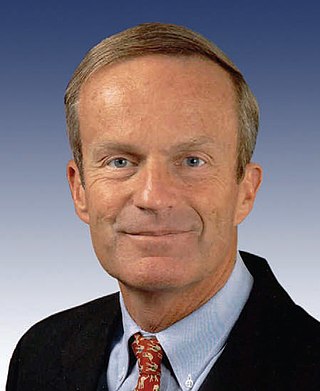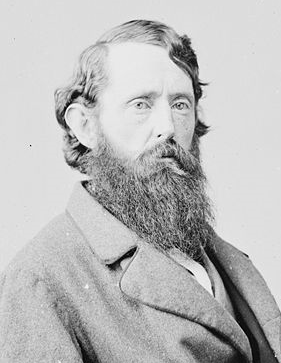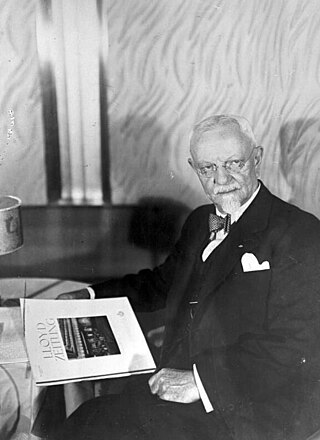
Schuyler Colfax Jr. was an American journalist, businessman, and politician who served as the 17th vice president of the United States from 1869 to 1873, and prior to that as the 25th speaker of the House of Representatives from 1863 to 1869. Originally a Whig, then part of the short-lived People's Party of Indiana, and later a Republican, he was the U.S. representative for Indiana's 9th congressional district from 1855 to 1869.

Chauncey Mitchell Depew was an American attorney, businessman, and Republican politician. He is best remembered for his two terms as United States Senator from New York and for his work for Cornelius Vanderbilt, as an attorney and as president of the New York Central Railroad System.

William Todd Akin was an American politician who served as the U.S. representative for Missouri's 2nd congressional district from 2001 to 2013. He was a member of the Republican Party. Born in New York City, Akin grew up in the Greater St. Louis area. After receiving his bachelor's degree from Worcester Polytechnic Institute in Massachusetts, Akin served in the U.S. Army Corps of Engineers and worked in the computer and steel industries. In 1988, he was elected to the Missouri House of Representatives. He served in the state house until 2000, when he was elected to the U.S. House of Representatives, in which he served until 2013.

Benjamin Gratz Brown was an American politician. He was a U.S. Senator, the 20th Governor of Missouri, and the Liberal Republican and Democratic Party vice presidential candidate in the presidential election of 1872.

The mayor of St. Louis is the chief executive officer of St. Louis's city government. The mayor has a duty to enforce city ordinances and the power to either approve or veto city ordinances passed by the Board of Aldermen. The current mayor is Tishaura Jones, who took office on April 20, 2021.

Dwight Filley Davis Sr. was an American tennis player and politician. He is best remembered as the founder of the Davis Cup international tennis competition. He was the Assistant Secretary of War from 1923 to 1925 and Secretary of War from 1925 to 1929.
Aloys P. Kaufmann was the 36th Mayor of St. Louis, serving from 1943 to 1949. He is, to date, the last Republican mayor of the city.

Bernard Francis Dickmann was the 34th mayor of St. Louis from 1933 to 1941.

Henry W. Kiel was the 32nd Mayor of Saint Louis, serving from 1913 to 1925.

Thomas Clement Fletcher was the 18th Governor of Missouri during the latter stages of the American Civil War and the early part of Reconstruction. He was the first Missouri governor to be born in the state. The Thomas C. Fletcher House was listed on the National Register of Historic Places in 1974.

Rolla Wells, also called "Rollo", was an American politician. He served two terms as Mayor of St. Louis, Missouri, was named an officer of the Democratic National Committee in the 1912 Wilson campaign, and served as Governor of the St. Louis branch of the Federal Reserve Bank.

John Fletcher Darby was a U.S. Representative from Missouri and the fourth mayor of St. Louis.

Richard Bartholdt was a U.S. Representative from Missouri.
Daniel D. Page was the second mayor of St. Louis, Missouri, United States.

John Marshall Krum (1810–1883) was a lawyer, jurist, and mayor. He was the 11th mayor of St. Louis, Missouri and the first mayor of Alton, Illinois. In 1860, he was the chairman of the Credentials Committee at the Democratic National Convention held in Charleston, South Carolina.
James H. Britton was the 23rd mayor of St. Louis, Missouri.

Henry Overstolz was the 24th mayor of St. Louis, Missouri, serving from 1876 to 1881. He was a direct descendant of the oldest patrician family of Cologne, Germany. He exerted a wide influence on public thought and action, upon political affairs and business activity.

Daniel G. Taylor was the 17th mayor of St. Louis, Missouri, serving from 1861 to 1863.

Oliver Dwight Filley was an American businessman, abolitionist, and politician who served as the 16th mayor of St. Louis, Missouri, from 1858 to 1861.
Philip H. Murray was an abolitionist, journalist, phrenologist, and civil rights activist who spent most of his career in St. Louis, Missouri. He grew up in Reading, Pennsylvania, where he participated in the abolitionist movement in that region.
















